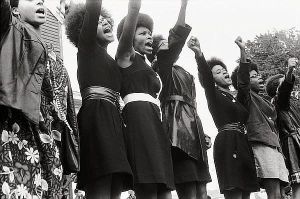The Black Power Mixtape 1967-1975 (2011)
The Black Power Mixtape 1967-1975 was released on April 1, 2011, in Sweden. The documentary film was produced by Story AB. The movie was written and directed by Göran Hugo Olsson[1]. Swedish television decides to cover the subject as they believe that America's media companies did not have the guts to do it and seemed to be not interested in the topic[2].
Plot
The film is considered itself as a mixtape, not a remix. The film portrays the anti-black racism movement in America from 1967 to 1975 which is recorded by Swedish journalists. The film is divided into nine chapters, one chapter for one year. In the earlier years, the film displays the struggle on how the fight towards racism. There was also resistance during the fight. The film includes the footage of the black power movement such as lead by Angela Davos, Stokely Carmichael, Eldridge Cleaver, and Huey Newton. In the 1970s, the film displays the community of African Americans emerged as their culture, fashions, the music went explosive to the whole America [3].
Black Empowerment

The film portrays how strong the black movement exists in the 1960s and 1970s. The activists such as Carmichael and Angela Davis inspire society on how to fight against racism despite the struggle they faced. The style of fighting racism was done through the culture like hairstyle and fashions that exhibited expressively. Moreover, the culture of African Americans was started to be accepted by society. In addition, the coverage by Swedish journalists lead to a cut off diplomatic relations between Sweden and the USA in 1972, as it shows footage critical of the black power movement[5]
Controversy
In the interview scene with Stokely Carmichael, he explains that African Americans suffer economic hardships due to racism. Also, several activists like Angela Davis were arrested for assassination, kidnapping, and other criminals (which they did not do). Although in the end, they were acquitted, the power against racism was very powerful at the time of the 1960s and 1970s[6].
References
- ↑ https://www.imdb.com/title/tt10369030/?ref_=nv_sr_srsg_0
- ↑ https://www.theguardian.com/film/2011/oct/20/black-power-mixtape-film-review
- ↑ https://www.filmcomment.com/article/the-black-power-mixtape-1967-1975-review/
- ↑ https://kpbs.media.clients.ellingtoncms.com/img/croppedphotos/2020/06/11/BlackPanthers_t800_t800.jpg?90232451fbcadccc64a17de7521d859a8f88077d
- ↑ https://www.hollywoodreporter.com/review/black-power-mixtape-1967-1975-96984
- ↑ https://www.npr.org/2011/09/08/140146806/mixtape-black-power-stories-seen-from-afar